Final report for SSC17-001
Project Information
The overall objectives ofthe 2017-2018 SC SARE Program will be to continue the existing strategic planning process for statewide sustainable agriculture development, to provide professional development opportunities for Extension agents, NRCS field staff and other agriculture professionals and reward outstanding service, and to continue to organize and conduct in -service training in sustainable agriculture practices. The MSP Assistant will work with the state SARE coordinators and advisory committee to organize training activities for 1890 and 1862 Extension and other agriculture professionals that will address critical needs identified by program stakeholders. The program advisory committee met in December 2016 to identify priority topics for the 2017-2018 training program that include: comprehensive IPM training for important vegetable crop families, farm labor issues, produce post-harvest handling, production of specialty grains, small farm tools and implements, non-GMO based egg production, rotational grazing strategies for livestock. Training will focus on an experiential approach to learning where classroom sessions are supplemented with hands-on training in the field. South Carolina State University 1890 Extension will continue to play a key role in planning and will continue to conduct training on sustainable vegetable production with a focus on small-scale and minority owned farms. The MSP position will continue to facilitate program reporting and evaluation, and will assist with project accounting and budgeting. A joint budget for Clemson and South Carolina State University has been developed. Funds will be administered through Clemson; South Carolina State University will submit invoices for training expenses to the Clemson Sustainable Agriculture Program
• Continue the existing strategic planning process for statewide sustainable agriculture development.
Building on new and existing collaborations with stakeholder groups, the state co-coordinators will work with the MSP Assistant and with the SC SARE Advisory Committee to broaden the pool of stakeholders including under-represented groups who are involved with the planning process and the development of educational programs. As in previous years, an annual sustainable agriculture retreat will be organized to identify priorities and to plan educational programs based on stakeholder needs. We will continue to collaborate on training programs with stakeholder organizations and with SARE PDP personnel from neighboring states when appropriate. The comprehensive and inclusive planning process will limit duplication of effort and will help to leverage available resources.
• Continue to provide professional development opportunities for Extension agents, NRCS, FSA and state
Department of Agriculture staff and other sustainable agriculture educators.
The outcomes of this objective are that these professionals will enhance their knowledge and competency in sustainable agriculture, they will increase their contact with the sustainable agriculture community, and they will be recognized as local experts to be called upon for information on sustainable agriculture. For 2017-2018 travel scholarships will be provided for select Extension agents and agricultural professionals to attend the Carolina Farm Stewardship Association (CFSA) Sustainable Agriculture Conference (November) and the Southern Sustainable Agriculture Working Group Conference (January). These events represent valuable educational opportunities for our agents and other agriculture professionals, and also facilitate interactions between agriculture professionals and farmers.
• Continue to support the "Outstanding Sustainable Agriculture Extension Agent of the Year" award to recognize SC cooperative extension personnel for excellence in sustainable agriculture outreach.
A call for nominations will be released in summer of each year open to 1890 and 1862 personnel. The award recipient will receive a travel scholarship to attend a sustainable agriculture event and a plaque recognizing their service to the sustainable agriculture community. The award will continue to encourage the development of innovative public outreach programs by our Extension agents.
• The SC SARE PDP Program will continue to organize and conduct in-service training opportunities for
Extension agents, NRCS, FSA and state Department of Agriculture personnel, agricultural educators, and
for other interested persons as space permits.
Workshop topics will be determined annually by the Advisory Committee (see listing of 2017 workshop topics below). The MSP Assistant, in consultation with the coordinators and the SC CFSA representative, will have overall responsibility for workshop organization, publicity and evaluation.
Advisors
Education
During this reporting period we have continued to emphasize an interdisciplinary, experiential, and participatory approach to training. For the majority of training practical classroom sessions were supplemented with hands-on training in the field; for example tours of farm demonstration plots, demonstrations of equipment, in-field calculations, and real time observations and decision making. Certain exceptions to this model were made for events that had the primary focus of providing intellectual information and resources only for a particular subject. Primary audiences for the training were 1862 and 1890 Extension agents, NRCS conservation field staff, farmers, and other agriculture professionals who serve small-scale, minority and limited resource farmers as well as those serving larger-scale conventional farms. Strong stakeholder participation and input into educational program development reinforced trainee participation and enthusiasm for the program. Participants in the educational programs increased competency and skills in areas related to sustainable agriculture. Participants gained the knowledge and confidence (i.e. competency) which enabled them to respond positively and knowledgeably to client inquiries regarding principles and practices of sustainable agriculture (based on survey feedback of the training events). Participation also facilitated integration into the sustainable agriculture community during networking sessions so participants are better able to refer clients to additional people/resources. We have also observed that participation in educational programs and interaction with other participants increases the trainee’s level of enthusiasm such that they become increasingly strong advocates for sustainable agriculture.
Education & Outreach Initiatives
To provide a practical look at using cover crops for no-till production in diversified vegetable farming systems in a workshop setting.
Cover crop specialists take a practical look at using cover crops for no-till production. Starting in the classroom, participants received an update on cover crop research projects , and had a discussion on nuts and bolts information like varieties, seeding methods, seeding rates, termination methods, planting vegetables into residue, and lessons learned related to all those things. Then participants headed to the field (Student Organic Farm in Clemson and CREC Research Farm in Charleston respectively) to look at plots, cover crop termination, and observe planting vegetables into residue. Plenty of time was provided for Q&A. Print resources were provided including SARE's Managing Cover Crops for Profitability.
AGENDA
9:00am Introduction
9:10 Optimizing Cover Crops for No-Till Vegetable Production: Research Update (Dave Robb)
9:45 Vegetable Production in No-Till Cover Crop Residue: Lessons Learned (Mark Dempsey & Dave Robb; Clemson/Dr. Brian Ward; Charleston)
10:45 Travel to Student Organic Farm or CREC
11:00 Farm Tour and Demonstration: Cover crop plots, termination methods, and transplanting into no-till residue
12:30 Lunch and discussion
1:45 Adjourn
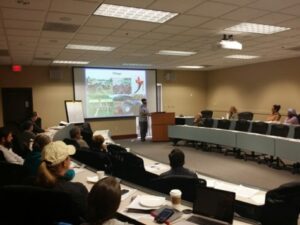
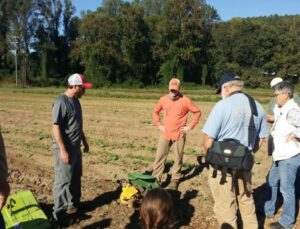
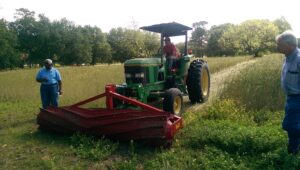
- Two 3/4 day events were organized in the subject area
- Charleston, SC - April 19th Coastal Research and Education Center, 2700 Savannah Hwy
- Clemson, SC - May 11th Madren Conference Center, 230 Madren Center Dr.
- Participants gained practical information on the use of cover cropping for no till vegetable production. This method, which uses a cover crop mulch to suppress weed growth during the vegetable growing season, offers a more sustainable approach to weed management than the frequent use of herbicides and tillage. This is an especially valuable tool for organic farmers who do not use synthetic herbicides and therefore must rely on frequent cultivation and tillage for weed control. Participants in the training gained knowledge of the current research on cover cropping and no-till production, and also practical information on how to select, plant and manage cover crops for no-till vegetable production. Through direct observation they were familiarized with the most effective cover crop termination techniques including roll-crimping and flail mowing.
- Each participant received a copy of the Sustainable Agriculture, Research and Education Program’s publication “Managing Cover Crops Profitably”.
Provide information on basic soil science, soil sampling techniques, interpreting soil test results, cover cropping to build soil health.
This workshop for farmers, ag professionals, and home gardeners covered the basics of soil health, including SC Soils 101, soil sampling techniques, interpreting soil test results, and using cover crops to improve soil health in both home gardens and commercial vegetable operations. Participants also received a tour of the host farm, City Roots, to learn about their soil building practices.
Speakers included:
Dr. Dara Park, Soil and Water Specialist, Clemson University
Gena Moore, Organic Research Coordinator, CFSA
David Robb, Program Associate, Clemson University
Eric McClam, Owner, City Roots Farm
This workshop was cooperatively sponsored by the Carolina Farm Stewardship Association, Richland Soil and Water Conservation District, City Roots Farm, and Clemson Sustainable Agriculture.
- One 3/4 day event was organized in the subject area.
- Participants gained practical information on the basics of soil health, soil sampling techniques and interpreting soil test results
- Participants gained practical information on using cover crops to improve soil health.
Provide practical information to diversified vegetable farmers on the management of diseases and insects in common crops including cucurbits, tomatoes, and greens in organic production systems.
This one-day course focused on management of key disease and insect pests of cucurbits (squash, cucumbers, and melons), tomatoes and leafy greens. Participants learned about techniques for disease and insect sampling and identification, how to diagnose damage and to determine whether damage warrants action, and about non-chemical approaches to management including cultural practices to prevent and avoid pests and diseases. Participants learned about organic certification guidelines related to pest management, and use of OMRI approved materials.
AGENDA
|
9:00AM |
Insect and Disease Management in Cucurbit Crops (Drs. Tony Keinath and Rebecca Schmidt-Jeffris, Clemson University) |
|
10:45 |
Break |
|
11:00 |
Insect and Disease Management in Solanaceae Crops Topics as described above (Tony Keinath & Rebecca Schmidt-Jeffris) |
|
12:30PM |
Lunch (provided on site) |
|
1:15 |
Video on pest sampling |
|
1:30 |
Insect and Disease Management in Leafy Greens - Topics as described above (Tony Keinath & Rebecca Schmidt-Jeffris) |
|
3:00 |
Organic Certification Guidelines for Pest Management and use of OMRI approved pesticides (Stephen Nix, Clemson Organic Certification Program) |
|
4:15 |
Adjourn |
Continuing Education Credits:
Up to 2 CECs for participants with a valid pesticide applicator license were offered for professionals seeking Continuing Certification hours.
About the instructors:
Dr. Anthony Keinath, Professor of Plant Pathology, Clemson University Coastal Research and Education Center, Charleston, SC. Dr. Keinath serves as the vegetable pathologist for South Carolina. He has served as chair of the Publications Board for the American Phyopathological Society, and as Editor-in-Chief of Plant Disease, the leading international journal for applied plant pathology research. His research focuses on management, ecology, and epidemiology of fungal and bacterial pathogens of cucurbits and cole crops and general integrated pest management for vegetables. His area of expertise is the fungus Stagonosporopsis citrulli, the cause of gummy stem blight and black rot on cucurbits.
Dr. Rebecca Schmidt-Jeffris, Assistant Professor of Entomology, Clemson University Coastal Research & Education Center, Charleston, SC. Dr. Schmidt-Jeffris serves as the vegetable and strawberry entomologist for South Carolina. She is an applied arthropod ecologist with an interest in whole-system IPM approaches for solving pest management problems. Her current research focuses on how cultural and biological control coupled with selective pesticide use can improve management outcomes.
Mr. Stephen Nix, Organic Program Coordinator, Clemson Organic Certification Program. Stephen received a B.S. degree in Geology from Clemson University. Before returning to Clemson in his role as Organic Program Coordinator, Stephen worked as an environmental consultant and also served as the South Carolina Food Systems Coordinator for the Carolina Farm Stewardship Association. Stephen also owns a small, diversified farm outside of Traveler’s Rest, SC.
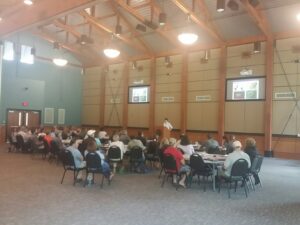
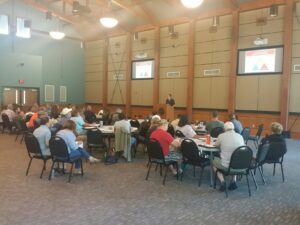
- One full day event was organized in the subject area.
- Participants gained practical knowledge of Identification of key diseases and insect pests
- Participants gained practical knowledge of damage and action thresholds
- Participants gained practical knowledge of non-chemical strategies (timing of planting, row/plant spacing, trap cropping, conservation bio-control and other effective cultural practices) for managing diseases and pests
Provide training in optimal soil management methods for addressing soil deficiencies in preparation for growing cover crops or forages in sustainable systems.
Healthy soils make healthy plants although achieving optimal soil health can be difficult. Many soils show deficiencies in nutrients and organic matter that need to be addressed before a successful crop or forages can be grown. At this workshop participants discussed how to find these deficiencies and what one can do through cover crops and applications to meet the needs of various crops. After lunch participants traveled to Bioway Farm in Ware Shoals, SC where they received a tour the facility, demonstrated soil testing procedures and talked with the farmer about his experiences with farming.
PRESENTERS
Gena Moore, Carolina Farm Stewardship Association
Mark Dempsey, Carolina Farm Stewardship Association
Bryan Smith, Clemson Cooperative Extension
AGENDA
9:30 am – 12:45 pm | Laurens County Farm Bureau 726 E Main St, Laurens, SC 29360
1:15 pm – 2 pm | Bioway Farm 197 Bio Way, Ware Shoals, SC 29692
- One 3/4 day event was organized in the subject area.
- Participants gained practical knowledge on identifying soil deficiencies and what one can do through cover crops and other applications to meet the needs of various crops.
Provide a full day training focused on the use of appropriate equipment and tools, both in terms of size and practicality, to increase production efficiency and profits for small diversified vegetable farmers.
Farm equipment expert and author Andy Pressman from the National Center for Appropriate Technology (NCAT) joined the CU Sustainable Ag Program for this special workshop focusing on equipment and tools for intensive crop production on a small-scale commercial farm. Workshop topics included understanding scales of production, selection of appropriate equipment, proper tool use and maintenance, buying new vs. used equipment, tractor safety, and more. The workshop also included a tour of the Clemson Student Organic Farm where participants observed a variety of hand tools and farm equipment, including a riding tractor and BCS walk-behind tractor with implements for a variety of operations.
ABOUT THE INSTRUCTORS
Andy Pressman has been with NCAT since 2007, helping farmers in the fields of whole-farm planning, small-scale intensive farming systems, organic crop certification, urban agriculture, and community food systems. Andy has a MS degree in Sustainable Systems from Slippery Rock University with an emphasis in agro-ecology and Permaculture design. He has extensive experience in market farming and in working with appropriately-scaled tools and equipment for the small farm. Andy and his family also operate Foggy Hill Farm, a small diversified farm and CSA located in Jaffrey, NH.
David Robb is a research associate and PhD student in the Plant & Environmental Sciences Program at Clemson. His master's and doctoral research focuses on cost-effective management of cover crop residue for no-till vegetable production. David is also serving as interim farm manager for Clemson University’s Student Organic Farm.
AGENDA
|
8:30 – 9:00 AM |
Check-in at Madren Conference Center (230 Madren Center Dr. Clemson, SC) |
|
9:00 |
Introduction – Dr. Geoff Zehnder |
|
9:15 |
In the Classroom with NCAT’s Andy Pressman - Tools for Small Farms |
|
11:15 |
Depart for Organic Farm |
|
11:30 |
Tour of Clemson Student Organic Farm operations – David Robb |
|
12:30 PM |
Lunch |
|
1:30 |
In the Field with NCAT’s Andy Pressman – Operation and Maintenance of Small Farm Equipment |
|
4:00 – 4:30 |
Questions and Adjourn |
|
4:30 – 6:00 |
Happy hour & appetizers with Andy Pressman at Sole On the Green (adjacent to the Student Organic Farm) |
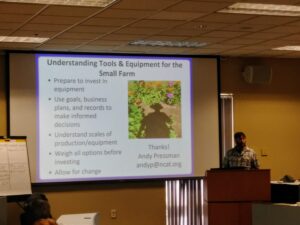
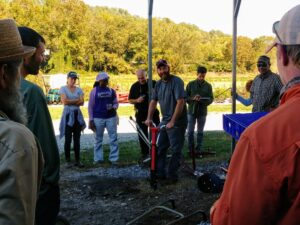
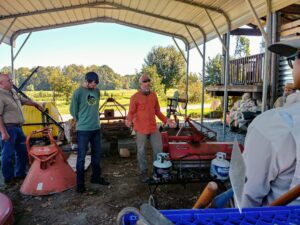
- One full day event was organized in the subject area.
- Participants gained practical knowledge about equipment and tools specifically for intensive crop production on a small-scale commercial farm.
- Participants gained practical knowledge about understanding scales of production, selection of appropriate equipment, proper tool use and maintenance, buying new vs. used equipment and tractor safety.
The goal of the training is to build the capacity of farmers to manage post-harvest practices meet the burgeoning demand for locally/regionally grown fruits and vegetables.
These trainings were held based on the tremendous response and positive feedback resulting from the Wholesale Success training events held in Charleston, Columbia and Clemson in 2016. The 2017 training built upon the previous events to guide participants in developing skills that are key to success in the marketplace, including post-harvest handling, cooling, packing, buyer-seller relationships, contracts, grade standards and more. As part of the classroom session the instructor guided participants through a post-harvest design process for their individual operations, and the workshops concluded with an on-farm demonstration and critique of an existing produce processing line (CREC and Clemson farms).
INSTRUCTOR
Atina Diffley, is an organic farmer and lead trainer for the FamilyFarmed Wholesale Success Program. Atina’s areas of expertise include post-harvest handling, brand-name marketing, greenhouse management, and organic farming systems. She is a co-author author/editor for Wholesale Success: A Farmers Guide to Selling, Postharvest Handling and Packing Produce, and she presently serves on the boards of the Organic Seed Alliance and the Minnesota Institute of Sustainable Agriculture. From 1985 to 2008, she and her husband Martin ran the Gardens of Eagan, an urban-edge, organic vegetable farm, which he started in 1973 as one of the first certified organic produce farms in the Midwest.
AGENDA
|
8:15AM |
Registration |
|
8:30 |
Welcome and Introduction |
|
8:50 |
Respiration, Temperature, and Quality Loss |
|
10:15 |
Break |
|
10:15 |
Postharvest Processes & Packing Shed Design |
|
Noon |
Lunch |
|
1:00PM |
Packing Standards and Grades |
|
2:45 |
Short drive to on-site produce processing facilities |
|
3:00 |
Demonstration: Produce Handling and Processing with Q&A |
|
4:45 |
Adjourn |
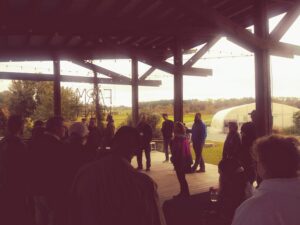
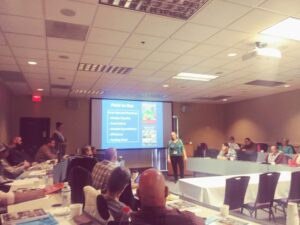
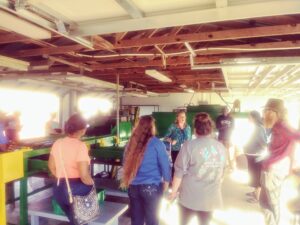
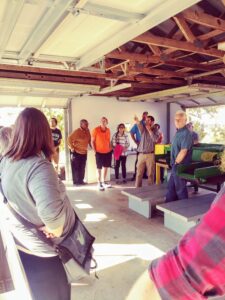
- 2 full day workshops were held in the subject area
- Monday, November 6th 2017 - Charleston, SC at Coastal Research & Education Center, 2700 Savannah Hwy.
- Thursday, November 9th 2017- Clemson, SC at the Madren Conference Center, 230 Madren Center Dr.
- Participants gained knowledge of produce harvesting and post-harvest methods that will increase their capacity to meet the burgeoning demand for locally/regionally grown fruits and vegetables. Adopting best practices in food safety, post-harvest handling, packing, and business management will help farmers be more efficient and profitable. It will also give buyers an incentive to increase their purchases of locally grown food.
- All training participants received the recently revised, 316-page “Wholesale Success” training manual that is the definitive training source on selling into wholesale markets. It includes topics such as: Calculating Return on Investment; Cleaning, Drying, and Curing Produce; Traceability; Packing Shed Design; and Maintaining the Cold Chain.
Provide required Produce Safety Alliance training for sustainable and organic fruit and vegetable farmers to satisfy the produce safety rule outlined in the Food Safety Modernization Act.
This training was offered to produce growers who must meet the requirements of the FSMA Produce Safety rule and others with an interest in the subject area.
The PSA Grower Training Course is a way to satisfy the FSMA Produce Safety Rule requirement outlined in § 112.22(c) that requires ‘At least one supervisor or responsible party for your farm must have successfully completed food safety training at least equivalent to that received under standardized curriculum recognized as adequate by the Food and Drug Administration.’
In addition to learning about produce safety best practices, key parts of the FSMA Produce Safety Rule requirements were outlined within each module.
After attending the entire course, participants received a certificate from the Association of Food and Drug Officials (AFDO) that verifies they have completed the training course. To receive an AFDO certificate, a participant must be present for the entire training and submit the appropriate paperwork to their trainer at the end of the course.

- A 1 day educational event was held in the subject area
- Participants gained practical and technical knowledge contained in these seven modules:
- Introduction to Produce Safety
- Worker Health, Hygiene, and Training
- Soil Amendments
- Wildlife, Domesticated Animals, and Land Use
- Agricultural Water (Part I: Production Water; Part II: Post-harvest Water)
- Postharvest Handling and Sanitation
- How to Develop a Farm Food Safety Plan
To provide information on high tunnel production of ginger and turmeric including production basics, management, and marketing information.
High tunnels provide many benefits for growers and open up new market opportunities. One new opportunity for growers is ginger and turmeric production. At this workshop participants learned how to grow ginger and turmeric, discuss crop planning and hear about using cover crops as a management technique. NRCS representative was also available to discuss cost share assistance for high tunnel purchasing.
Speakers
Christina Newhouse – Southwestern NC RC&D
Gena Moore – Carolina Farm Stewardship Association
Dave Robb – Clemson Sustainable Agriculture Program
Josh Boatwright – Natural Resource Conservation Service
Location
230 Madren Center Drive Clemson, SC (morning) & Clemson University Student Organic Farm: 190 Field Station Drive Clemson, SC (afternoon)
- 1 day educational event was held in the subject area
- 1 site tour was held in the subject area
- Participants gained knowledge about the production of turmeric and ginger in high tunnels that will enable them to expand into these niche market opportunities.
To convene stakeholders in the sustainable agriculture industry in South Carolina to discuss needs and prioritize training topics for the upcoming year.
To collect input on preference for training in sustainable agriculture from our public stakeholders.
To review critical issues, challenges, and needs related to sustainable agriculture development in South Carolina.
To identify and prioritize sustainable agriculture training needs that can be addressed with available funding from SARE and other sources.
To develop a plan for educational/training programs to be organized in the following year to address the critical issues that are identified
The public was invited to the annual Open Forum on Sustainable Agriculture to discuss critical issues, challenges and needs related to Sustainable Agriculture development in South Carolina. The meeting was open to all South Carolina farmers, educators, policy makers, state and federal government and non-governmental agricultural agency personnel, and other South Carolina citizens with an interest in sustainable agriculture.
The Open Forum meeting was held on the 30th of November, 2017 at the Kingston Plantation Embassy Suites Resort in Myrtle Beach, SC. The Myrtle Beach location was chosen this year to facilitate participation by many of our stakeholders who also attended the Southeast Vegetable and Fruit Expo held from November 27th -29th and the South Carolina Farm Bureau (SCFB) Annual Meeting from November 30th - Dec. 2nd at the same location.
After the Open Forum, the SC SARE state advisory committee meeting met to prioritize training topics discussed earlier that day. Each SC SARE advisory member receives an invitation to an annual South Carolina Sustainable Agriculture Research and Education (SC SARE) Advisory Committee meeting.
AGENDA
|
8:45 - 9:30 |
Check in (Coffee and refreshments served) |
|
9:30 - 9:40 |
Introduction and welcome (Dr. Geoff Zehnder) |
|
9:40 - 10:15 |
Group introductions (Individuals representing other organizations will have an opportunity to briefly discuss new or ongoing initiatives) |
|
10:15 - 10:35 |
Review of 2017 programs and accomplishments (Geoff Zehnder) |
|
10:35 - 11:35 |
Open discussion on issues relating to sustainable agriculture development in South Carolina. Where should we put program resources in 2018? (Facilitated session) |
|
11:35 - 11:45 |
Break |
|
11:45 - 12:30 |
Continue discussion to prioritize issues and Adjourn |
|
12:30 - 1:30 |
Local Foods Lunch and adjourn Open Forum Meeting |
|
1:30 - 4:30 |
SC SARE Advisory Committee Meeting (AC Members) |
- 1 half day Open Forum meeting was organized and held at a centralized location in the state where stakeholders came and provided valuable input for developing future training initiatives.
- 1 half day SARE Advisory Committee meeting was held to prioritize training activities for 2018
- Ag professionals and farmers from around the state were given an opportunity to share information with the group about program activities which facilitated networking and collaboration.
Provide a training for new farmers on how to take an interpret soil tests.
Clemson Soils lab manager, Shannon Alford, and Area Extension Specialist, Kerrie Roach, provided detailed information on how to take a soil sample, interpret the results and make decisions on soil amendments based on those results during this class. Participants who had a soil test done already were invited to bring it along for interpretation. Other examples of soil tests were available to review as well during the training.
AGENDA
6:00pm – Arrive (Introductions)
6:10 – Tour of Soil Lab (Shannon Alford)
6:30 – Taking a Soil Test and Reading the Results (Shannon Alford)
7:15 – How to Interpret Results for Best Farming Practices (Kerrie Roach)
7:50 – Questions
8:15 – Adjourn
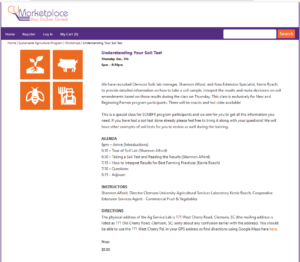
- 1 evening session was organized in the subject area
- This training was in partnership with the South Carolina New and Beginning Farmer Rancher program which facilitates opportunities for new farmers to find the information and resources they need. There were 13 SCNBFR Program participants at this event.
- Participants gained practical knowledge of how to take a soil sample, interpret the results and make decisions on soil amendments based on those results.
To provide an educational event highlighting beneficial insects as an important part of on-farm integrated pest management.
This training featured speakers Dr. Rebecca Ann Schmidt-Jeffris, Clemson University Assistant Professor of Vegetable and Strawberry Entomology; and Emily Bonilla, USDA-NRCS District Conservationist. During this workshop, Dr. Schmidt-Jeffris discussed the importance, identification, biology, and conservation of beneficial insects, including the natural enemies of pest insects. Ms. Bonilla shared information about USDA-NRCS programs to assist with pollinator habitat enhancement.
- One two hour lecture was organized in the subject area.
- Participants gained practical information on the role and importance of beneficial insects in sustainable farming systems.
Provide foundational information on how to create an online presence for your farm business with guidance on several popular methods.
Participants learned about various online platforms that they can use to promote and expand their farm business with instruction from Clemson University’s Public Service and Agriculture division communicator, Donna Bowen. This training was catered to the specific needs of the participants as identified through a survey of all registrants. Topics included website development, a social media overview, how to create a social media marketing plan, analytics, and Facebook advertising.
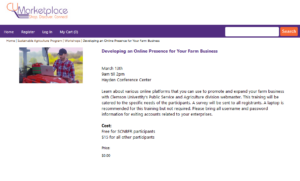
- 1 full day training was organized in the subject area
- Participants gained practical knowledge about various online platforms that they can use to promote and expand their farm business.
- This training was in partnership with the South Carolina New and Beginning Farmer Rancher program which facilitates opportunities for new farmers to find the information and resources they need. There were 8 SCNBFR Program participants in attendance at this event.
Provide an opportunity for participants to learn about a low cost DIY tunnels and other buying and construction options including cost share opportunities.
High tunnels offer many benefits in vegetable and small fruit production. However, purchasing and installing can be costly. Participants learned about a low cost DIY tunnel that can be installed in hours as well as other buying and construction options including cost share opportunities.
Summer and fall production can be difficult in high tunnels due to excessive heat and high pest pressure. Instructors discussed production options for high tunnels during summer months and how to prepare for fall crops. A portion of this day was HANDS-ON learning.
- 1 full day training event was organized in the subject area
- Participants gained practical knowledge about a low cost high tunnel that can be installed in hours in addition to other buying and construction options including cost share opportunities.
- Participants gained practical knowledge of uses for and sustainable production in high tunnels.
- Participants gained experience in building a low cost high tunnel.
Provide training on various ways to structure labor on a small farm taught from the experiences of established regional farmers.
Farming on a small farm requires labor, not just from the farmer but from others as well. This 4-hour workshop showcased how to structure labor on a small farm through the eyes of established regional farmers. Farmers who are looking to take their farms 'to the next level' were encouraged to attend by bringing on additional labor support. Legal and financial considerations will be highlighted and discussed to better understand which labor structure best fits your farming model.
Participants were able to:
- Learn about different ways to structure labor on your farm including apprenticeship, paid hourly workers, temporary workers, volunteers.
- Discover best practices for managing people on the ground.
- Learn how to incorporate education on the farm.
- Understand legal considerations you need to know for your labor structure.
- Clarify the financial process for paying workers or apprentices.
- Be aware of equity issues with on-farm labor.
- Hear from experienced farmers running successful farms in South Carolina.
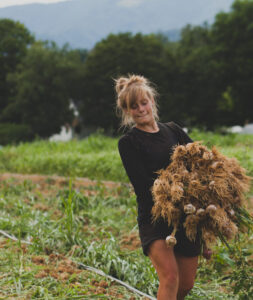

- 1 full day training event was organized in the subject area
- This training was in partnership with the South Carolina New and Beginning Farmer Rancher program which facilitates opportunities for new farmers to find the information and resources they need. There were 10 SCNBFR Program participants in attendance at this event.
- Participants gained practical knowledge of options for managing labor on their farms under various circumstances.
Educational & Outreach Activities
Participation summary:
Learning Outcomes
Project Outcomes
Participant feedback is a valuable reference to gauge the quality of the training programs we provide in addition to their impact. Participants are surveyed between 1 and 6 months after a training event and, in addition to demographic information, are asked to provide feedback on how the training programs impacted their work in agriculture. Here is a sample of the feedback:
"Simply listening to the experiences that the farmers have had with the different types of structures was incredibly valuable."
"How complicated labor laws are. This class was complete with professionals to guide you through the laws."
"Very thorough and realistic. Thank you!"
"Andy has an amazing depth of knowledge regarding farm equipment. I am no longer afraid to try a walk behind tractor!"
"I gained a lot. I'll be scouting my fields regularly to look for indicators of any problems."
"I have been to several of your trainings. Each time I leave more prepared to succeed at my farm endeavors."
Face of SARE
The South Carolina Sustainable Agriculture Research and Education (SARE) Program is conducted as a partnership between Clemson University and South Carolina State University with support from Southern Region SARE. The program is managed by stakeholder input through an advisory committee consisting of farmers, agriculture professionals, non-government representatives and others with an interest in sustainable agriculture development. Our mission/strategic plan is to provide sustainable agriculture education and outreach programs to Cooperative Extension Service personnel, Natural Resources Conservation Service staff and other agriculture professionals, farmers, and landowners with an interest in sustainable agriculture.
To the extent possible we will emphasize an interdisciplinary and participatory approach to training. For example, the training on pest management utilizes an experiential approach where participants perform pest sampling and identification, will observe pest management operations in the field and will participate in pest control decision-making exercises. Training will focus on an experiential approach to learning where classroom sessions are supplemented with hands-on training in the field. Primary audiences for the training are 1862 and 1890 Extension agents, NRCS conservation field staff, and other agriculture professionals. Agriculture professionals who serve small-scale, minority and limited resource farmers as well as those serving larger-scale conventional farms will be encouraged to attend. Strong stakeholder participation and input into educational program development will reinforce trainee participation and enthusiasm for the program.
The Sustainable Agriculture Program website highlights the SA Program and provides information on training events through a calendar of activities and descriptions of successful projects. In addition, the MSP Assistant maintains a state calendar of sustainable agriculture training events that is accessible to all stakeholder organizations who conduct sustainable agriculture training. The calendar is used to coordinate training dates and to facilitate collaboration and leveraging of resources to organize joint training in areas of shared interest. The program website is a resource with links to training materials and links to additional resources on sustainable agriculture. The program website also provides updated information including contact information for program members, a calendar of activities that is linked to stakeholder organization event calendars, and links to funding opportunities. While the program website serves as a valuable tool for disseminating information, email announcements to a listing of over 2,000 stakeholders is our primary means of communication.
We also provide consultation to agriculture professionals and farmers interested in developing SARE grant proposals, and we promote the availability of SAN resource materials regularly via announcements to our email list. A link to the SAN website and funded grant program database is provided on the program website. Notices of new SAN publications are disseminated to agents via email, and a pool of funds will be set aside to purchase cost publications for agents based on programmatic and financial need. Incoming Extension agents will be encouraged to complete the Southern and National Core Sustainable Agriculture curricula. Announcement of the annual call for SARE/NACAA Sustainable Agriculture Fellows program applications will be forwarded via email to Clemson and SCSU Extension agents and we will provide assistance with application development to agents interested in applying. Efforts are also made to invite Southern Region SARE personnel to South Carolina to discuss grant opportunities and other relevant SARE programs.